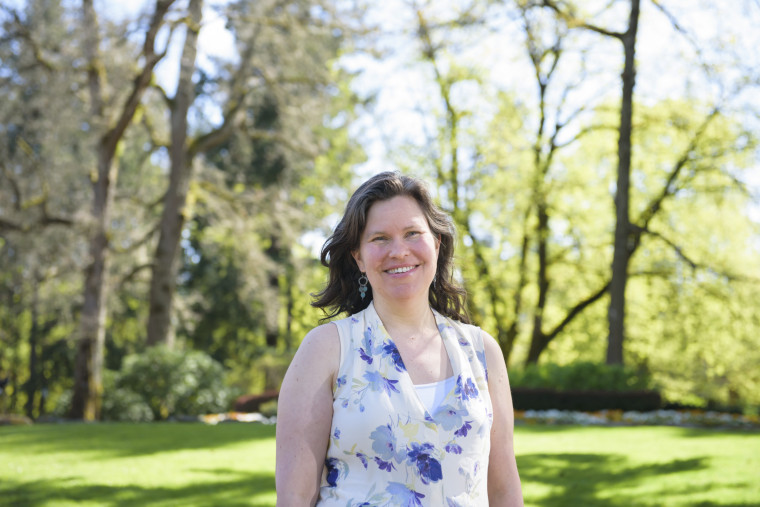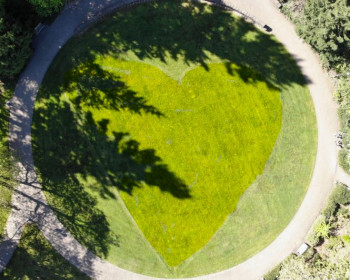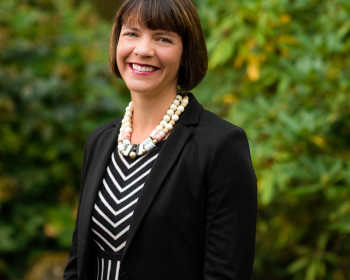Q&A with Lewis & Clark’s New Chaplain and Director of Spiritual Life Hilary Martin Himan
Open gallery

Last month, Hilary Martin Himan began her new position as Lewis & Clark’s chaplain and director of Spiritual Life. She replaced Dean of Spiritual Life Mark Duntley who retired after nearly 32 years of service. In the following Q&A, Hilary shares her path to Lewis & Clark, her work toward social justice, and the necessary adaptations of spiritual care and wellness during a pandemic.
What was your path to Lewis & Clark?
Professionally, my indirect path to Lewis & Clark started as a church pastor. After graduating from Harvard Divinity School, I began my ministry in Minnesota ordained with the United Church of Christ. I then served as an associate minister in Storrs, Connecticut, where part of my portfolio was reaching out to University of Connecticut students. With a small group of student leaders from my church, we launched an affordable alternative spring break program for Hurricane Katrina relief. I soon realized working alongside college students was my favorite part of the job. I loved seeing the transformation in their leadership skills. I felt privileged to accompany them on their spiritual journeys. And it was just fun to be with them—whether talking about God, engaging in rose-bud-thorn reflections, hanging drywall, or hosting fundraisers. I wanted more of that!
In 2009, I moved back to Minnesota—where I was raised—for a self-imposed sabbatical. But as an old Yiddish proverb says, “We plan, God laughs.” My stint in Minnesota didn’t last long, as I fell in love and followed my sweetie to Oregon, and pursued a second master’s degree in College Student Services Administration at Oregon State University. The program is grounded in social justice, and that perspective was critical to my individual growth. The program really challenged me to personally identify ways in which I was still maintaining or supporting oppressive systems. I took classes on transgender Issues, learned about Kimberlé Crenshaw’s theory of intersectionality, and studied multicultural issues and combatting “isms.” A highlight of my time at Oregon State was meeting the needs of Muslim students by installing a foot washing station open to all in the campus library.
I found my way to Lewis & Clark by way of a grad school class project that connected me with Mark Duntley. I so enjoyed my conversation with Mark that when it came time to pursue an internship, I knew who to call! Mark agreed to the internship, and from there he was able to create a part-time position for me. When Mark retired this summer, I gratefully accepted the promotion to become the chaplain and director. I feel blessed to be following in the footsteps of such a beloved dean of Spiritual Life and be the first female and LGBTQ clergy to occupy this role.
How does your office support social justice and faith in action?
Our office has been committed to supporting social justice and faith in action for some time now. In 1979, the Reverend Mark and Dr. Corinne Chamberlin endowed our office with a lectureship to support social justice lectures and other programs. Over the years, we have brought great thinkers to campus to challenge us on social justice issues such as James Forman Jr. and Ash-lee Woodard Henderson from the Highlander Center to be Chamberlin speakers. In my previous role as Chamberlin social justice and faith in action coordinator, I also organized panel discussions on Islamophobia and religious discrimination in the workplace. Our efforts at educating around topics of social justice don’t simply remain an intellectual exercise. We have brought students to the interfaith movement for immigrant justice silent protest walks with Buddhists around the ICE building, and weeded the land with the Woodleys at Eloheh Farm and Indigenous Center for Earth Justice. We have handed out hot cups of coffee to those who are food insecure in downtown Portland. There are always new opportunities to seek justice and change the world for the better, working in collaboration with others and being mindful of our places of privilege. I am excited to have the new Center for Social Change and Community Involvement for future collaborations.
What hobbies and interests do you have outside of work?
Would picking up Legos be considered a hobby? Jennie, my spouse, and I have two kids, ages almost 8 and 5, who keep us busy. I also love theater and performance art when it’s not a pandemic. I am a certified InterPlay facilitator, which combines improvisation, movement, storytelling, and music. I describe this community-building practice as that “kindergarten class where you run around the room—for adults.” I love reading books, both fiction and nonfiction. Thrifting and treasure hunting is great fun, inspired by my grandmother who I called the bargain hunter of Indianapolis. Being outdoors, going for walks in the woods, and tent camping are also favorite family activities. My friend who is a collage artist recently introduced me to that genre, so I have stacks of vintage National Geographics waiting for me to cut and paste…I love being creative when I make the time.
There are at least a dozen spiritual life groups active on campus. How do these groups enrich campus life?
First of all, they remind us that we are not homogenous in how we make meaning. Understanding religious diversity and having some basic religious literacy is so important for all of us as citizens of the world, even if we identify as secular or feel antagonistic toward religion. It’s important to take the opportunities presented at Lewis & Clark to learn—especially outside of the classroom. Attend the Ramadan iftar, listen to praise music at the chapel service, visit the gurdwara, walk silently with the Buddhists in protest. Experiential learning is so rich with possibilities—right here on campus and in the greater Portland area.
Your question also speaks to our second identified goal of our strategic plan, which is understanding and celebrating spiritual identities. The spiritual life groups on campus help students understand their own spiritual identity, and offer opportunities to explore how they might discover a spiritual identity if they don’t currently have one.
Relating back to our first goal around belonging, various religious and spiritual student groups also enrich the campus by serving as labs for experimenting with peer-to-peer support and connection. Spiritual Que(e)ry began in 2014 to provide an open and vulnerable space for students who identified as LGBTQIA+ or questioning to explore their faith. We had one atheist student attend Spiritual Que(e)ry regularly who called herself a “spiritual ally.” Students also find a sense of belonging in Bible study with InterVarsity, or eating challah with their Jewish classmates at Friday Shabbat. We try our best to help students “find their people.”
What sorts of programs fall under the umbrella of spiritual care and wellness?
Spiritual care and wellness is actually a wide umbrella. We often think of something like meditation or yoga as spiritual wellness, but something like the On Being Discussions on Race & Healing or engaging in a book study can fall under that umbrella as well. Even if you don’t believe in a higher power, you can spiritually be taking care of yourself and seeking wellness by asking critical questions:
- Why am I here?
- What am I passionate about?
- Who am I?
Living in this pandemic has forced me to sharpen my focus on what’s important to me and how I can find a greater sense of peace living in liminality. Sometimes I find it’s less about the programs per se, and more about the relationships. Being over doing.
What are you looking forward to in your new role?
I’m looking forward to having expanded responsibilities and being able to shape the vision and mission of the Office of Spiritual Life. I am looking forward to helping the entire campus understand the broader ways that we can support our community—especially those who consider themselves secular or unaffiliated with any particular religious tradition. I also look forward to helping create policies and procedures that can truly support underrepresented religious students. Religious and spiritual identity is another aspect of diversity, and when academic calendars make it difficult for students to observe Rosh Hashanah or fast for Ramadan, we aren’t living our mission. I want to remove barriers for students and make the system more just.
I’m also hoping to achieve the strategic direction goals identified last year under Mark’s leadership. Fostering a sense of spiritual belonging is our primary goal. I’m curious how we create spaces that actually foster deeper connection, whether that be in student organizations, one-hour meetings, or in the physical spaces we inhabit. The COVID-19 pandemic continues to feel isolating, and we need the spiritual practice of connecting with others while honoring what feels safe. Leading the virtual On Being Discussions on Race & Healing group series last year showed me the potential power in an online gathering. I learned a lot—sometimes through moments of what didn’t work—and I am excited to continue this work.
What’s on tap for spiritual life in the academic year 2021-22?
I plan on continuing the On Being discussions, and we’re hoping to continue a lot of our programming that we have done in the past with shifts and tweaks. We acknowledge that we are living in a pandemic that is keeping us on our toes. We’ve got staff and affiliates that are all developing plans in collaboration with student leaders. Look for meditation and labyrinth walks, Bible studies with InterVarsity, Friday Shabbats with Hillel and a matzo ball soup hotline, carpools to Catholic mass, evangelical worship with Pio Christian Fellowship, and more. As I said, this is a liminal time, and we need to listen and pay attention.
Sacred Design Lab, owned by some Harvard Divinity School alums, gave me the shorthand for our goals that I’m adopting for our own use in the Office of Spiritual Life:
- Belonging: knowing and being known; loving and being loved;
- Becoming: Growing into the people we are called to be;
- Beyond: Experiencing ourselves as part of something more.
I hope we can help our campus achieve those goals of belonging, becoming, and beyond through our programs and relationships, while also being open to innovation and flexibility. We continue to live in a pandemic, after all!
More The Source Stories
email source@lclark.edu

